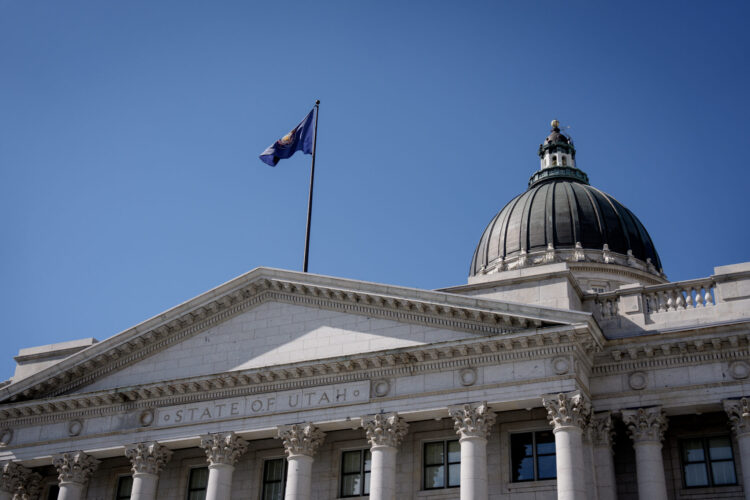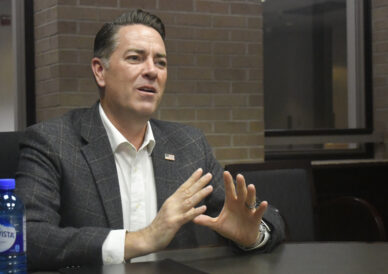Utah lawmakers give initial nod to bill defining who holds the rights to geothermal energy
If the legislation is approved next year, the Division of Water Rights will continue issuing permits to develop geothermal

Photo by Spenser Heaps for Utah News Dispatch
The Capitol in Salt Lake City is pictured during a special legislative session on Oct. 6, 2025.As geothermal developments bloom in Utah, lawmakers aim to answer: who has claim on the geothermal resources in the state?
“We have a lot of geothermal resources, and they’re not being developed as much as they should or could be,” Senate Majority Assistant Whip Mike McKell, R-Spanish Fork, told the Natural Resources, Agriculture, and Environment Interim Committee on Wednesday. “And the question was, who owns the geothermal resource in the state of Utah? Is it a water right? Is it a surface right, or is it a mineral right?”
Currently, the Utah Division of Water Rights reviews permits for geothermal developments, a process that can be done in about 30 days, Senate Majority Assistant Whip Mike McKell, R-Spanish Fork, told the Natural Resources, Agriculture, and Environment Interim Committee on Wednesday.
While industry players are happy with the fast permitting timelines, there’s still uncertainty about who holds what right, McKell said.
The process, under a new bill from McKell, will be a little bit of a hybrid. Land owners will be able to own the energy-producing heat below their land, regardless of whether someone else owns rights to minerals like oil or gas in the space.
However, energy producers must also have a water right for the geothermal fluids they have to use since traditionally, the technology uses water or working fluids to carry heat to turn turbines.
The Division of Water Rights would still approve applications to operate wells for geothermal production under McKell’s bill.
The bill would also affect the water rights division’s public record practices. If approved, it would delete part of the code that says that geothermal filings to the division are public records “unless the owner or operator requests, in writing, that the records be held confidential” for a maximum of five years.
“Previously, the state engineer would hold the proprietary data for five years. It’s reducing that to one year, which we think is a good thing to encourage geothermal development,” state engineer Teresa Wilhelmsen told the legislative panel.
The proposal passed as a committee bill, but still faced skepticism from some members. The bill will go through a full legislative approval process with considerations in Senate and House committees, a path that McKell specifically requested.
“This is a big enough issue, and I think it’s actually helpful for us to signal this to industry that we’re working on it and we’re providing this clarity,” McKell said.
Other Western states are mixed on geothermal rights, McKell said. Wyoming, for example, includes geothermal fluid in its definition of underground water, so energy producers need to apply for a water permit to access the geothermal heat. Others, like Nevada, Oregon and Washington tie geothermal rights to the owners of the land on the surface.
Utah has essentially been operating under the model laid out in the bill, but it’s now being codified, McKell said.
Jim Goddard, geothermal program manager at the Utah Division of Water Rights, said in a presentation that this bill would tackle one application of geothermal generation — electricity, which is accomplished at high temperatures.
Other geothermal uses, like direct heating and cooling done at lower temperatures, will be regulated differently.
The Point development, located at the site of the former Utah State Prison, for example, has the potential to develop an existing geothermal well to provide community heating and energy, greenhouse support and recreation. Because the system used at The Point isn’t hot enough to produce electricity, it wouldn’t fit in this specific legislation.
One of McKell’s goals with the bill is to make the regulatory burden as low and economical as possible, he said. Another is to encourage private geothermal development in the state.
During the meeting Rep. Carl Albrecht, R-Richfield, expressed concern about whether the geothermal operation would affect local water rights used for irrigation and other purposes.
“That is exactly why we have to keep a water right attached, so that we can go through that process and identify if existing rights will be impaired or affected by that, and then we can take appropriate action,” Wilhelmsen said.



